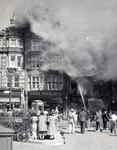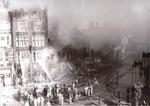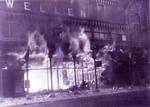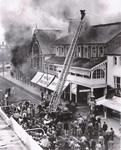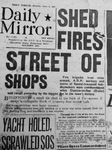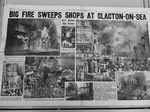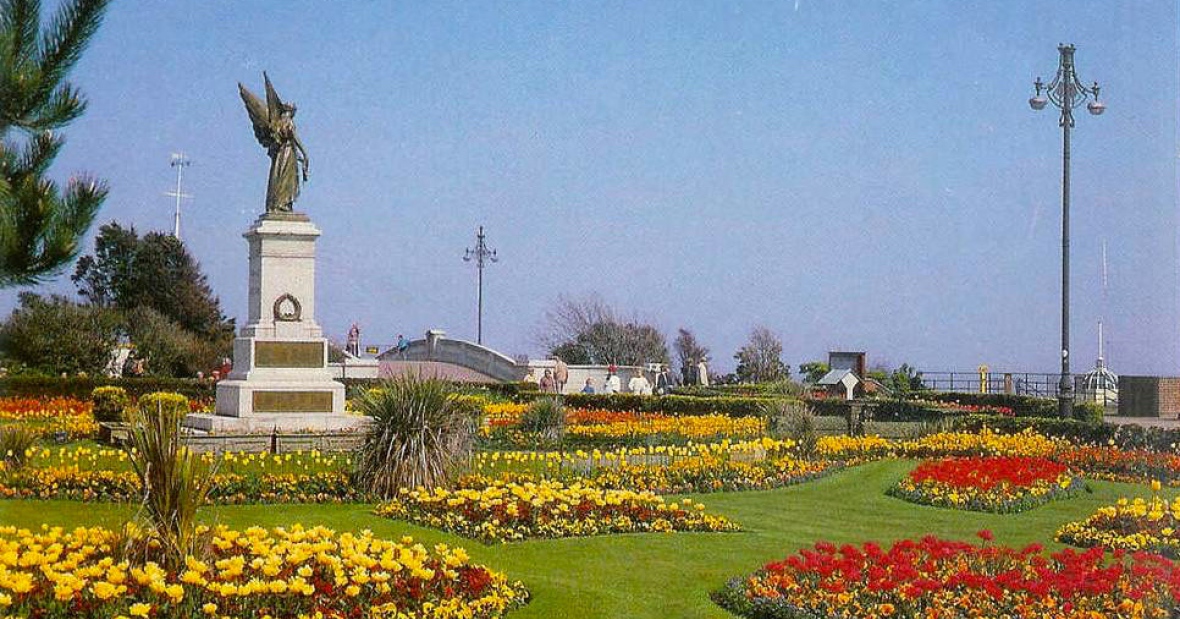
The Lewellen's Fire 1939 by Norman Jacobs
On 4 June 1939, Clacton was the subject of hourly BBC News bulletins, while on 5 June, every national newspaper carried stories on the events in Clacton of the preceding day – the Daily Mirror in particular devoting the whole of its front page and centre page spread to them
So what was it that caused Clacton to become the focus of such widespread national attention? This was how the local Clacton newspaper, the Clacton News, described it:
“Amid crashing walls, loud explosions and bursting glass, firemen, watched by hundreds of enthralled spectators, battled against a blazing inferno which destroyed a block of buildings in Pier Avenue, Clacton.”
That fire has now passed into Clacton folklore as the “Lewellen’s Fire”.
The fire started somewhere between 2:45 and 3:00 on the afternoon of 4 June 1939 and was first spotted by Miss Violet Burke, the cook at the Bohemian Café, which stood over the International Stores next door to Lewellen’s.
From her second-floor window she could see a small blaze in Lewellen’s yard. A shed, a dustbin and some other material were on fire. She realised quickly that is was not just someone burning rubbish as the flames were spreading too rapidly for that. Looking on in horror as the fire gained in intensity and spread towards the International Stores, she screamed out, “Fire! Fire!”, while the manageress, Miss D Benson, immediately phoned for the fire brigade. As she did so, there was a loud explosion in the yard. The staff of the Bohemian Café rushed out into the street as quickly as possible.
At 3:06 p.m. Clacton Fire Brigade receive the call and at 3:08, Chief Officer, W H Woods, with three men and the Leyland Turntable Machine left the Fire Station. He left orders that the Merryweather Fire Engine and the Dennis Trailer Pump were to follow immediately.
At 3:12 the fire siren sounded at Butlin’s during the bathing beauty parade. Mr Myers and Mr Blackmore, in command of the Butlin’s Voluntary Fire Brigade, plus 12 men raced off to Lewellen’s to offer assistance. Mr Ernest Kingsman offered the use of the Pier Swimming Pool so the Butlin’s Brigade linked up their two pumps to the pool and played water over the Royal Hotel. Their continuous efforts were later considered to be a crucial factor in saving the hotel. Meanwhile members of the public continued to bathe in the pool.
At 3:22 the Merryweather arrived with Second Officer Curtis and seven men. Two hoses were worked from the hydrant at the corner of Pallister Road. A few minutes later Chief Officer Woods decided to call in the Colchester Fire Brigade.
At 4:00 a party of elderly ladies returned from the beach for their afternoon tea in a café in Pier Avenue. They became highly indignant when a police officer told them they couldn’t enter the street!
Five minutes later, Colchester Fire Brigade arrived with a motor pump and within another five minutes, 40 members of the Clacton ARP Auxiliary Fire Service, many still in their best Sunday clothes, reported for duty, bringing the Dennis trailer from the station. By now a vast crowd of sightseers had gathered, including many from local villages.
The Colchester Brigade began to work from a hydrant in Rosemary Road in an attempt to save the Castle Restaurant. Flames were now shooting as high as 50 feet and a pillar of smoke could be seen from as far away as Frinton, Dovercourt and Brightlingsea.
At 5:00 p.m. a sudden change of wind direction saved the Royal Hotel but debris was blown all over Clacton. Showers of sparks and burning debris were falling on the Gaiety and Criterion Restaurants and Marshall’s Amusements on the opposite side of the road. Marshall’s roof actually caught fire but was promptly extinguished. Residents in Edith Road were forced to put out a number of fires and sparks also set light to the premises of the Daimler Hire Service and Ellis’s Garage in Agate Road. Only the prompt action of Captain E R Pennell in bringing the firefighting equipment of the Kinema Grand into played saved the cinema. Fires were starting as far away as Park Road and Clacton Hospital, where a chair outside the main entrance was set on fire by falling debris. Burning embers drifted as far away as Butlin’s.
Stores of paraffin, turpentine, methylated spirits and paint caused numerous explosions at Lewellen’s causing walls to collapse, roofs to cave in, windows to shatter and gas mains to explode. A chimney stack crashed through the side wall of the Castle Restaurant. By now the fire was completely out of control and very dangerous.
Water pressure began to fall causing the fire brigade problems in reaching the tops of buildings with their jets. Fortunately however it began to rise again and by 5:30, thanks to the unceasing efforts of the fire brigade, the rise in water pressure and the drop in the wind, the fire gradually began to burn itself out.
At 6:00 p.m., Chief Officer Woods announced that he considered the fire now under control and at 8:30, both the Colchester Brigade and Butlin’s Voluntary Brigade left the scene though the Butlin’s Brigade remained on standby until 11:00 p.m.
Throughout the night, the men of the regular fire brigade remained on duty. Refreshments were provided by the Royal Hotel and Councillor Arthur Green, the Chairman of Clacton Urban District Council, who arranged for hot meals to be provided at Sam Isaac’s Restaurant in Station Road.
The scene in Pier Avenue was said to be more amazing even than during the day with floodlights lighting up the ruined and smoking buildings and clouds of steam rising into the air. Also during the night, the plate glass windows of the shops opposite collapsed as they began to cool following the intense heat.
At 8:00 a.m. the next morning, large numbers of sightseers gathered to gaze upon a scene of utter desolation never before equalled in the town’s history. What was once the most imposing block of shops in the town was now a mass of twisted girders and fallen masonry. The fire brigade decided they needed to demolish any walls still standing for safety reasons.
Although referred to as the Lewellen’s Fire, a number of other shops and businesses were either totally or partially destroyed. These were:
Bohemian Café: This is the café from where Miss Burke had first spotted the fire. The café was totally destroyed including all equipment, books and records. All the staff were re-employed in the Corner House Café.
International Stores: Totally destroyed. The manager, Mr Cutting, was at home when he received the message that his shop was on fire. He cycled over on his tandem, picking up Mr Ager, the son of Mr Ager of the High Street shop, on the way. Mr Ager dashed inside the shop as soon as they arrived but discovered that the lights had failed. He ran to get the lamp from the tandem but the police advised him not to re-enter. Five minutes later the whole of the roof collapsed inwards and flames shot sky high. All the Store’s stock was destroyed including five pairs of weighing scales, a bacon slicer and two trade tricycles. The business was transferred to their Station Road branch.
Baxfield (Provisions): Completely gutted.
W.E.Milbourne (Wholesale Grocer): Losses estimated at between £10,000 and £20,000. The whole of their main warehouse was gutted. Milbourne’s moved into temporary premises at the corner of Pallister and Orwell Roads.
Noble (Tobacconist): Totally destroyed by falling debris.
Clacton Club: The Clacton Club shared the same building as Lewellen’s and was totally destroyed. Its lounges, furniture, fishing and game trophies, billiard tables and other valuable property vanished. Mr and Mrs Stephens, the live-in steward and stewardess, lost everything. Fortunately they themselves were out when the fire started. All that was saved from the club was its fire-proof safe containing the club’s records. The club re-opened at 6:00 p.m. on the Monday in new premises at Stamford House, Station Road.
Foyster (Restaurant): Foyster’s got off comparatively lightly thanks to the sudden change of wind at 5:00 p.m., though the roof was badly damaged when part of it was deliberately demolished by the fire brigade in an earlier attempt to prevent the fire spreading. The downstairs and first floor dining rooms were unharmed by the fire but suffered considerable damage from the water played on the building. Mr Kingsman offered Foyster’s the use of one of the halls on the Pier while repairs took place to enable them to honour bookings.
Royal Hotel: Although in the end the main part of the hotel was undamaged, there had been great concern early on over the garage. Mr Gwyther, in charge of the garage, called for help to move the cars out. As many were locked, they had to be lifted bodily into Colne Road. At one point a jet of water from a fire hose threw Mr Gwyther against the wall. Although drenched to the skin he managed to continue the work. But even more serious than the cars was the fact that there was an underground tank storing 500 gallons of petrol. Mr Parker, the manager, organised staff and volunteers to cover the area with wet carpets, sand and anything they could get hold of to keep the fire away. Efforts at saving the garage were mainly successful, though there was some slight damage.
Castle Restaurant: Extensive damage. The 75 year old proprietor, Mr Victor Cheeld, who watched the fire from Cordy’s Restaurant, said afterwards that “the whole Castle Restaurant will have to come down and be rebuilt.” Mr Cheeld acquired premises in Agate Road and continued his business from there.
And what of Lewellen’s itself?
Mr Douglas Lewellen, a partner in the firm, was at Clacton Hospital demonstrating the iron lung when he heard the fire hooter sound. By the time he and his brother, Mr Griffith Lewellen, arrived at the scene his premises were engulfed in flames and all they could do was look on as their business burnt to the ground. Of their entire stock, all that was saved was two budgerigars and three canaries from the model garden in the centre of the shop. These were rescued by Mr Walker who had entered the premises whilst the fire was licking the back walls. The strong room containing all their books and papers was also unharmed.
During the Sunday afternoon, Mr and Mrs Skull of Stafford House, Marine Parade, offered Lewellen’s their premises in West Avenue, formerly occupied by Messrs Smiths’ Furnishing Stores. Posters announcing the fact that they would be open for business the next day were printed by Messrs A Quick & Co Ltd and distributed that afternoon.
By the Tuesday (6 June), Mr Douglas Lewellen was able to say, “The firm is now running full blast…we are able to supply almost anything. The works department is going on as before. We can accept all orders. We can take on all our old jobs.
Amazingly there was only one reported casualty throughout the whole fire and that was Chief Officer Woods himself. He explained his accident to the Clacton Graphic,
“I went upstairs in Lewellen’s building to see if it was safe to get men inside to stop the fire spreading. I opened a door, and flames at once sprang at me. I hurriedly closed it, and, as I stepped back, the flooring gave way. My foot went through and turned over, but I regained my balance and came out…I did not realise I had sprained my ankle until I started to run to give assistance at Marshall’s Amusements and tripped over a brick, and twisted it again!”
The only other possible casualty was Robert Taylor, the dark tabby cat belonging to the Bohemian Café. He was not seen after the fire though staff were sure he had left the building.
The fire was certainly a landmark in Clacton’s History. It destroyed much of the centre of the old original seaside resort founded in 1871 by Peter Bruff, including the show-piece original Public Hall.
The Clacton Time of 17 June 1939 however looked on the future optimistically,
“From the mass of ruins caused by the fire…will rise a new block of modern 3-storey business premises.”
And the cost of this venture was to be £50,000, exactly half of the estimated cost of the damage caused by the fire.

